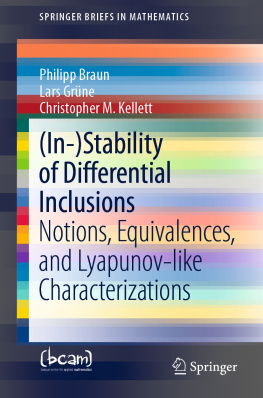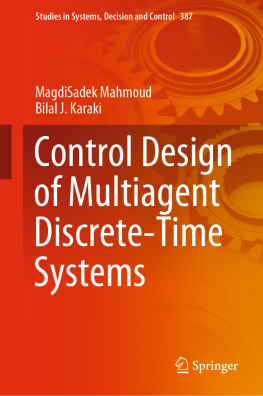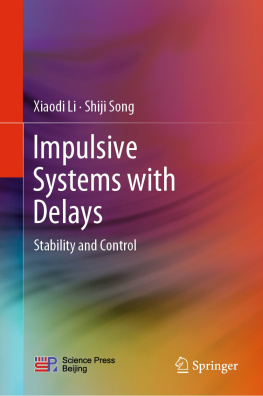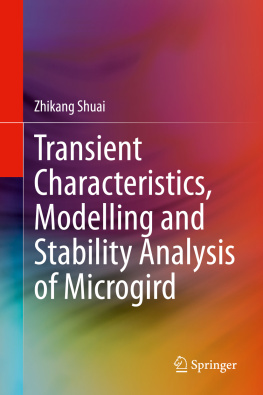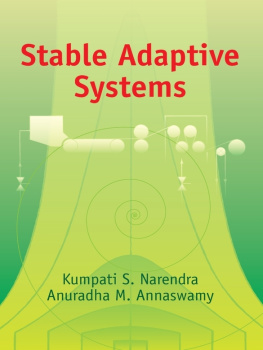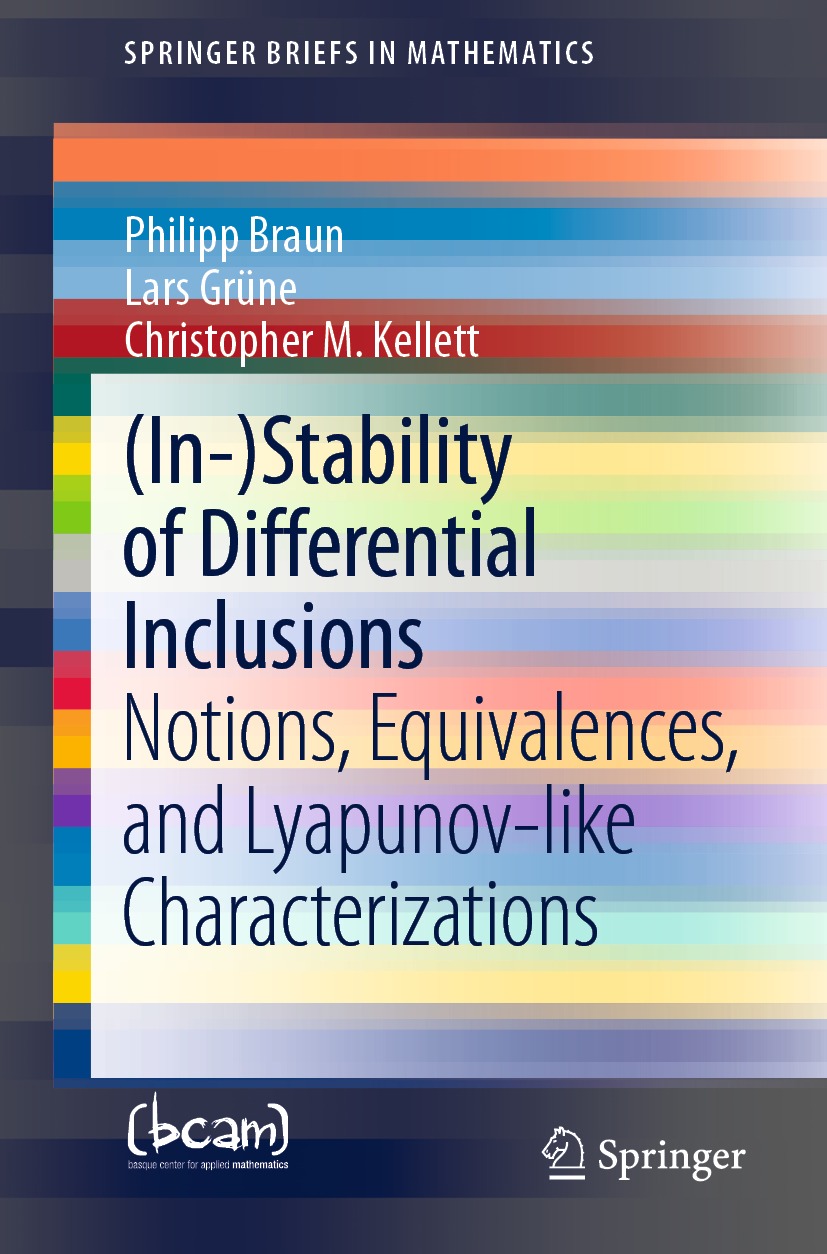SpringerBriefs in Mathematics
Series Editors
Nicola Bellomo
Torino, Italy
Michele Benzi
Pisa, Italy
Palle Jorgensen
Iowa, USA
Tatsien Li
Shanghai, China
Roderick Melnik
Waterloo, Canada
Otmar Scherzer
Linz, Austria
Benjamin Steinberg
New York, USA
Lothar Reichel
Kent, USA
Yuri Tschinkel
New York, USA
George Yin
Detroit, USA
Ping Zhang
Kalamazoo, USA
SpringerBriefs in Mathematics showcases expositions in all areas of mathematics and applied mathematics. Manuscripts presenting new results or a single new result in a classical field, new field, or an emerging topic, applications, or bridges between new results and already published works, are encouraged. The series is intended for mathematicians and applied mathematicians. All works are peer-reviewed to meet the highest standards of scientific literature.
BCAM SpringerBriefs
Editorial Board
Enrique Zuazua
Department of Mathematics
Friedrich-Alexander-Universitt Erlangen-Nrnberg
Erlangen, Germany
Deusto Tech
Universidad de Deusto
Bilbao, Spain
and
Departamento de Matemticas
Universidad Autnoma de Madrid
Cantoblanco, Madrid, Spain
Irene Fonseca
Center for Nonlinear Analysis
Department of Mathematical Sciences
Carnegie Mellon University
Pittsburgh, USA
Juan J. Manfredi
Department of Mathematics
University of Pittsburgh
Pittsburgh, USA
Emmanuel Trlat
Laboratoire Jacques-Louis Lions
Institut Universitaire de France
Universit Pierre et Marie Curie
CNRS, UMR, Paris
Xu Zhang
School of Mathematics
Sichuan University
Chengdu, China
BCAMSpringerBriefs aims to publish contributions in the following disciplines: Applied Mathematics, Finance, Statistics and Computer Science. BCAM has appointed an Editorial Board, who evaluate and review proposals.
Typical topics include: a timely report of state-of-the-art analytical techniques, bridge between new research results published in journal articles and a contextual literature review, a snapshot of a hot or emerging topic, a presentation of core concepts that students must understand in order to make independent contributions.
Please submit your proposal to the Editorial Board or to Francesca Bonadei, Executive Editor Mathematics, Statistics, and Engineering: francesca.bonadei@springer.com.
More information about this series at http://www.springer.com/series/10030
Philipp Braun , Lars Grne and Christopher M. Kellett
(In-)Stability of Differential Inclusions
Notions, Equivalences, and Lyapunov-like Characterizations
1st ed. 2021

Logo of the publisher

Logo of the publisher
Philipp Braun
School of Engineering, Australian National University, Canberra, Australia
Lars Grne
Mathematical Institute, Universitt Bayreuth, Bayreuth, Bayern, Germany
Christopher M. Kellett
School of Engineering, Australian National University, Canberra, Australia
ISSN 2191-8198 e-ISSN 2191-8201
SpringerBriefs in Mathematics
ISBN 978-3-030-76316-9 e-ISBN 978-3-030-76317-6
https://doi.org/10.1007/978-3-030-76317-6
The Author(s), under exclusive license to Springer Nature Switzerland AG 2021
This work is subject to copyright. All rights are solely and exclusively licensed by the Publisher, whether the whole or part of the material is concerned, specifically the rights of translation, reprinting, reuse of illustrations, recitation, broadcasting, reproduction on microfilms or in any other physical way, and transmission or information storage and retrieval, electronic adaptation, computer software, or by similar or dissimilar methodology now known or hereafter developed.
The use of general descriptive names, registered names, trademarks, service marks, etc. in this publication does not imply, even in the absence of a specific statement, that such names are exempt from the relevant protective laws and regulations and therefore free for general use.
The publisher, the authors and the editors are safe to assume that the advice and information in this book are believed to be true and accurate at the date of publication. Neither the publisher nor the authors or the editors give a warranty, expressed or implied, with respect to the material contained herein or for any errors or omissions that may have been made. The publisher remains neutral with regard to jurisdictional claims in published maps and institutional affiliations.
This Springer imprint is published by the registered company Springer Nature Switzerland AG
The registered company address is: Gewerbestrasse 11, 6330 Cham, Switzerland
Preface
The fundamental theory that emerged from Aleksandr Mikhailovich Lyapunovs doctoral thesis [50] more than 100 years ago has been and still is the main tool to analyze stability properties of dynamical systems. Lyapunov or Lyapunov-like functions are monotone functions when evaluated along the solution of a dynamical system. Based on the monotonicity property, stability or instability of invariant sets can be concluded without the need to derive explicit solutions of the system dynamics.
In this monograph, existing results characterizing stability and stabilizability of the origin of differential inclusions through Lyapunov and control Lyapunov functions are reviewed and new characterizations for instability and destabilization characterized through Lyapunov-like arguments are derived. To distinguish between stability and instability, stability results are characterized through Lyapunov and control Lyapunov functions whereas instability is characterized through Chetaev and control Chetaev functions. In addition, similarities and differences between stability and instability and stabilizability and destabilizability of the origin of a differential inclusion are summarized. These connections are established by considering dynamics in forward time, in backward time, or by considering a scaled version of the differential inclusion. In total, the diagram shown in Fig. 1.1 is obtained, unifying new and existing results in a consistent notation.
As a last contribution of the monograph, ideas combining control Lyapunov and control Chetaev functions into a single framework are discussed. Through this approach, convergence (i.e., stability) and avoidance (i.e., instability) are guaranteed simultaneously.
The genesis of this monograph emerged from the preliminary results in [11], published as a conference paper in the proceedings of the 57th IEEE Conference on Decision and Control. Additionally, the ideas combining properties of control Lyapunov and control Chetaev functions rely on conference papers [13] and [14].

